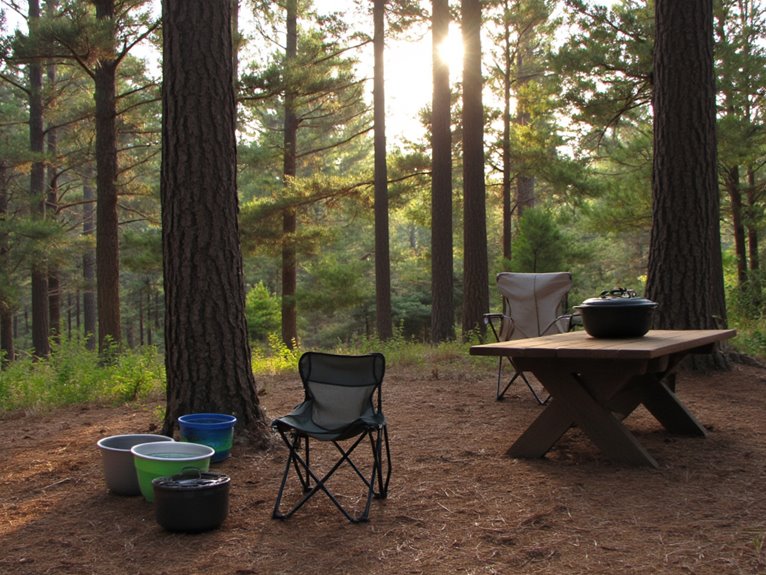Compact Vs Full-Size Camping Furniture: Selecting for Your Trip Type
Choose compact camping furniture weighing 1-5 pounds for backpacking trips where space and weight matter most. These ultralight options fold to water bottle dimensions but sacrifice comfort features. Select full-size furniture weighing 13-17 pounds for car camping when you prioritize comfort and durability. Full-size chairs offer ergonomic support, higher weight capacities of 500-800 pounds, and built-in features like lumbar support. Your trip type directly determines the ideal balance between portability and comfort for maximum outdoor enjoyment.
We are supported by our audience. When you purchase through links on our site, we may earn an affiliate commission, at no extra cost for you. Learn more. Last update on 8th January 2026 / Images from Amazon Product Advertising API.
Notable Insights
- Compact chairs (1-5 pounds) suit backpacking with ultralight portability, while full-size models (13-17 pounds) excel for car camping comfort.
- Full-size chairs offer superior ergonomics with lumbar support and 19-20 inch seat heights versus compact models sacrificing comfort for weight.
- Weight capacity differs significantly: compact chairs support 250-400 pounds while full-size options handle 500-800 pounds with enhanced durability.
- Backpackers need carbon fiber and aluminum alloy furniture that costs 40-60% more than standard full-size steel frame options.
- Full-size chairs include built-in coolers and multiple cup holders, while compact models focus on minimal features and integrated carrying cases.
Weight and Portability Trade-offs Between Compact and Full-Size Options
The fundamental decision between compact and full-size camping furniture centers on weight versus functionality trade-offs that directly impact your camping experience. Compact chairs weigh between 1-5 pounds, with ultralight models like the Helinox Chair Zero reaching just 1 pound 2 ounces. Full-size options range from 13-17 pounds but offer superior comfort and stability.
Your choice depends on transport ease requirements. Compact furniture folds to water bottle dimensions, fitting easily into backpacks for hiking trips. Full-size chairs collapse but remain bulky, suitable primarily for car camping scenarios. Just as camping lights offer collapsible designs that reduce size to phone dimensions for easy transport, furniture manufacturers prioritize space-saving features.
Weight limits vary greatly between categories. Compact chairs typically support 200-250 pounds due to lightweight frame materials. Full-size models accommodate 400+ pounds through robust construction. Mid-range options like the Nemo Stargaze offer a balanced approach with aircraft-grade aluminum construction that maintains durability while keeping weight manageable at under 8 pounds.
Consider your camping style: ultralight backpackers prioritize minimal weight, while car campers can afford heavier, more comfortable options. Many full-size chairs include integrated pockets and storage compartments for easy access to personal items and beverages during extended use. Budget-conscious campers can find quality options like the classic folding camp chair for under $20 at major retailers.
Comfort and Ergonomic Features Across Different Furniture Sizes
While compact camping chairs prioritize portability over comfort, full-size models deliver superior ergonomic features that greatly impact your outdoor experience.
Full-size chairs incorporate built-in lumbar support and zero-gravity reclining systems that reduce lower back strain during extended use. They feature higher seat heights of 19–20.7 inches, making sitting and standing easier while maintaining proper knee alignment at 90-degree angles.
Full-size camping chairs feature ergonomic lumbar support and optimal seat heights that promote proper posture and reduce back strain.
Compact chairs sacrifice these ergonomic benefits for reduced weight and pack size. They typically lack targeted spinal support and use lower seat heights that can impede accessibility.
Full-size models also utilize breathing materials like mesh or textilene fabrics that promote airflow and prevent heat buildup.
Wide, padded armrests reduce shoulder tension while maintaining correct posture throughout your camping experience.
Weight Capacity and Durability Requirements for Various Camping Conditions
Beyond comfort considerations, weight capacity and durability serve as essential determining factors when selecting camping furniture for different outdoor environments.
Compact chairs typically support 250-400 pounds, while full-size models handle 500-800 pounds through superior material strength. Weight distribution becomes vital during dynamic use-movement and outdoor conditions create stresses beyond static load ratings.
Frame materials directly impact performance. Military-grade aluminum and powder-coated steel provide maximum load-bearing capacity. 600-denier ripstop fabrics resist tearing better than lightweight alternatives. Heavy-duty chairs feature reinforced welds and robust construction for rugged terrain.
Environmental factors demand specific durability features. Wet conditions require rust-proof frames and mildew-resistant fabrics. UV-resistant coatings prevent sun degradation.
Reinforced stitching at stress points-joints and armrests-extends lifespan during frequent use across varying camping conditions. Similarly, camping cots demonstrate this principle with models like the ABORON XXL supporting an exceptional 900-pound capacity through heavy-duty square steel construction and double-layer 1200D Oxford fabric.
Storage Features and Additional Functionality Comparison
Storage solutions transform camping furniture from basic seating into versatile outdoor command centers.
Compact models excel through storage innovations like integrated zippered bags and carrying cases that protect gear during transport. You’ll find accessories such as clip-on cup holders that add functionality without increasing bulk.
Full-size options prioritize functional design with built-in coolers, multiple drink holders, and storage shelves. The GCI Master Cook Station exemplifies this approach with beneath-surface organization space for cooking equipment.
Compact chairs emphasize ultralight frames with simple folding mechanisms and dual-lock stability systems.
Full-size units incorporate complex features like reclining, rocking, and swivel actions for extended comfort. The Coleman Cooler Quad Chair combines seating with cooling storage.
Weight considerations differ markedly: compact gear minimizes transport burden while full-size furniture uses heavier materials for enhanced stability and expanded storage capacity. Many chairs also feature side pockets for drinks and personal items alongside built-in cooler bags to keep refreshments easily accessible during outdoor activities.
Matching Furniture Size to Specific Trip Types and Budget Considerations
Your trip type determines which furniture size delivers best performance and value. Backpackers need ultralight gear with compact materials like carbon fiber and aluminum alloys.
Trip type dictates furniture performance – backpackers require ultralight carbon fiber and aluminum gear for optimal value.
These items fold flat and weigh under two pounds but cost 40-60% more than standard options. Car campers can choose full-size furniture with padded seating and sturdy steel frames.
Weight isn’t restrictive, so you’ll find broader price ranges and better camping aesthetics. RV users benefit from permanent installations using wood or metal construction that mimics home furniture.
Budget considerations vary considerably: compact gear demands premium pricing due to advanced materials, while full-size options offer competitive pricing through larger market availability and heavier materials. Similar to camping furniture, waterproof ratings of 3000mm+ provide serious weather protection for outdoor gear investments. Backpacking gear prioritizes weight and portability targets similar to ultralight tents that weigh between 2.75 to 4 pounds with compact packed dimensions.
On a final note
You’ll find success by matching furniture size to your specific camping style. Compact options work best for backpacking trips under three days where weight matters most. Full-size furniture suits car camping and extended stays where comfort takes priority. Consider your pack weight limits, available storage space, and trip duration when deciding. Don’t compromise on weight capacity ratings regardless of size-your safety depends on proper load specifications for your chosen gear.

